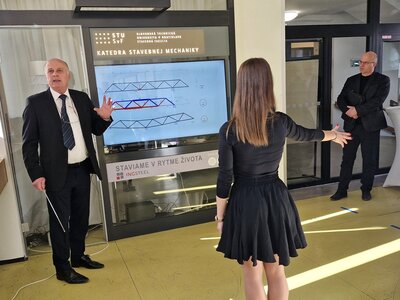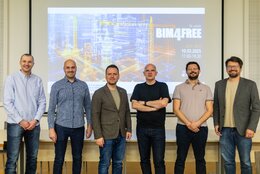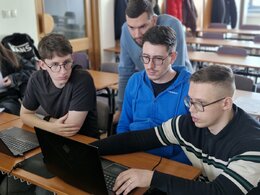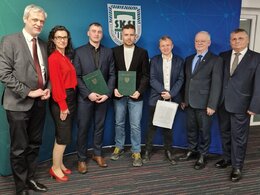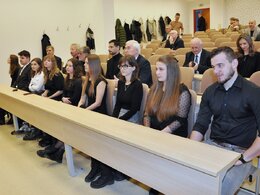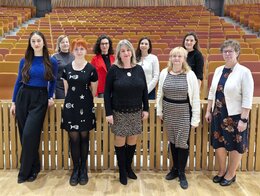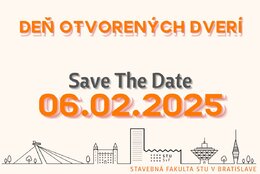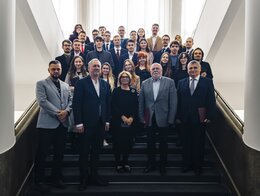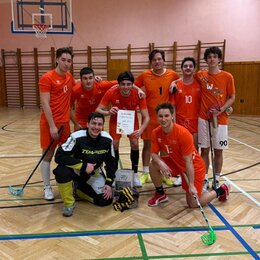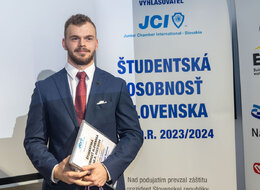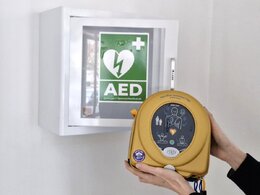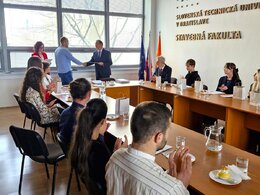Academic Year 2024/2025
- The academic year is divided into two semesters: winter semester and summer semester.
- Teaching period consists of 13 weeks in each semester.
- The examination period consists of 7 weeks in each semester.
- Holidays are 45 days (working days).
- The opening ceremony of the academic year 2025/2026 takes place on 16.09.2025.
The schedule is specified in accordance with Art. 8 point 3 of Study Regulations of the Slovak University of Technology in Bratislava:
| Winter semester | 01.09.2024 - 16.02.2025 | |
| Introduction to study * | 02.09.2024 - 14.09.2024 | |
| Opening ceremony of the academic year | ||
| Teaching period | ||
| Examination period | 16.12.2024 - 21.12.2024 07.01.2025 - 15.02.2025 |
|
| Winter holiday | 23.12.2024 - 04.01.2025 | |
| Summer semester | 17.02.2025 - 31.08.2025 | |
| Teaching period | 17.02.2025 - 17.05.2025 | |
| Examination period | 19.05.2025 - 04.07.2025 | |
| Summer holiday | 07.07.2025 - 31.08.2025 | |
* Introduction to study is meant for students enrolled in the first year of Bachelor study programmes. The specific date is assigned by the Dean of the Faculty.
The summarised schedule of the academic year 2024/2025 can be found here.
Public holidays and rest days:
| 15.09.2024 | Blessed Virgin Mary | 06.01.2025 | Epiphany |
| 01.11.2024 | All Saints´ Day | 18.04.2025 | Good Friday |
| 17.11.2024 | Struggle for Freedom and Democracy Day |
21.04.2025 | Easter Monday |
| 24.12.2024 | Christmas Eve | 01.05.2025 | International workers´ Day |
| 25.12.2024 | Christmas Day | 08.05.2025 | Day of victory over fascism |
| 26.12.2024 | St. Stephen´s Day | 05.07.2025 | St. Cyril and Methodius |
| 01.01.2025 | Day of the Establishment of the Slovak Republic | 29.08.2025 | Slovak National Uprising Day |
Timetables for Civil Engineering study programmes of the current academic year can be found in Academic Information System (AIS).
Student scientific conference (SSC)
Organizational rules:
- Conference date
The student scientific conference takes place in the summer semester of the respective academic year. The date is set at the beginning of the academic year and is to be found in the calendar of the faculty. - Council of student scientific conference
The student scientific conference is guaranteed by the council of SSC, chaired by the Vice-Dean for Science and Research, by the members of chairs, and by expert committees of individual sections. - Conference organization
Departments, in cooperation with SAS (Slovak Academy of Sciences) and practice representatives, publish proposals for topics that could be discussed within the students' scientific and creative activities at the beginning of the academic year. Students choose a department and a teacher for their supervision according to their own preferences. - Scientific sections
The departments apply for a faculty round of the SSC in the form of a binding application (Appendix 3) no later than 1 month before its holding. The number and the name of sections are determined based on the applications.
The condition for a separate section is, at least, 6 submitted papers. One department can have a maximum of one section. In case of a larger number of papers, the section can be divided into subsections, but the number of awards does not change. - SSC papers
Students submit their papers in accordance with the prescribed template. Adherence to the scope and to the prescribed form is the condition for accepting the papers. The paper is assessed by an independent reviewer in the prescribed form. The assessment is then attached to the paper. All assessed papers must be submitted one week before the conference by the secretary of the committee, who forwards them to the chairman and to the members of the committee. - Scientific committee
The scientific committee consists of leading experts from the faculty in the following structure:- the chairman is a professor (in exceptional cases an associate professor),
- a member of the department,
- a representative of another department,
- an external member (other faculty, SAS, practice),
- a Ph. D. student - secretary of the committee.
- Organization
SSC takes place on the premises of the faculty. Students defend their papers in front of a scientific committee and the public. The length of the performance, together with the discussion, is not recommended to be longer than 15 to 20 minutes for one contestant. - Awards
After the conference, the scientific committee proposes an order of the competitors in each section. They may also propose the Dean's Award, the Literary Fund Award and the Association of Slovak Scientific and Technological Societies (ASSTS) Award. Awarded papers are rewarded financially. If there are 4 papers or less in a section, only 1 paper receives a financial reward. If there are 5 papers in a section, the first 2 papers receive a financial reward. If there are 6-9 papers in a section, the first 3 papers receive a financial reward. If the number of papers in a section is 10-13, the first 4 papers receive a financial reward. If the number of papers in a section is 14 or more, the first 5 papers receive a financial reward.
The Dean of the Faculty, in consultation with the council of the SSC, awards the Dean's Award to the best paper. The rewards are determined by the financial possibilities of the faculty in the given academic year. - Nationwide and international conference
According to the order and the relevant conditions, the SSC council delegates the representatives of the faculty to national or international conferences.
This page is dedicated to all students interested in applying to any offered scholarships, internships, or exchange programmes. The list is continuously refreshed in order to keep up with all the new upcoming opportunities. As the content contains information from a third-party, it is needed to follow the given links and instructions provided on their web pages.
SAIA, n. o. (Slovak Academic Information Agency) is a non-governmental non-profit organisation which offers programmes and provides services in order to support and enhance the internationalisation of education and of research in Slovakia since 1990.
BEST Bratislava is a student non-profit organisation working at the Slovak Technical University in Bratislava. BEST Bratislava is one of 95 local BEST groups operating in 32 European countries. Their main activities include organising training sessions, technical competitions and a summer course for technical school students from all over Europe. The organisation was founded 25 years ago and since then they have been providing additional education to all STU students.
IAESTE (The International Association for the Exchange of Students for Technical Experience) is an international organisation for exchange students at technical universities, which provides internships. It is part of the IAESTE A.s.b.l (Association sans but lucrative) group, which is registered in Luxemburg. It gives students the possibility to travel to one of 85 member countries. Students are given the chance to do an internship at academic institutions or in companies. They improve their professional and language skills, meet members of various cultures, and many of them make among their colleagues and/or other interns’ friends for life. It can be an unforgettable experience and a milestone for their future.
AIESEC is a global platform for young people who wish to explore and to develop their leadership potentials. They are a non-political, independent, not-for-profit organisation run by students and recent graduates of institutions of higher education. Its members are interested in world issues, leadership and management. AIESEC does not discriminate the applicants based on their ethnicity, gender, sexual orientation, religion nor national or social origin. Since their foundation, they have engaged and developed over 1,000,000 young people. The impact of the organisation can be seen through their alumni that represent business, NGO, and world leaders, including one Nobel Peace Prize laureate, Martti Ahtisaari of Finland.
CEEPUS is an acronym for “Central European Exchange Program for University Studies”. Current member countries are: Albania, Austria, Bosnia and Herzegovina, Bulgaria, Croatia, the Czech Republic, Hungary, North Macedonia, Moldova, Montenegro, Poland, Romania, Serbia, the Slovak Republic and Slovenia. Prishtina/Kosovo is also participating. The main activity of CEEPUS is to support university networks operating joint programmes ideally leading to Joint Degrees, esp. Joint Doctoral Programs. CEEPUS covers mobility grants for students and teachers in this framework.
The Austria - Slovakia action, cooperation in science and education, is a bilateral programme supporting cooperation between Austria and Slovakia in higher education, science and in research.
National Scholarship Programme of the Slovak Republic - The Government of the Slovak Republic approved the establishment of the National Scholarship Programme of the Slovak Republic in order to support mobility of students, Ph.D. students, university teachers, researchers and artists in 2005. The National Scholarship Programme of the Slovak Republic (NSP) is funded by the Ministry of Education, Science, Research and Sport of the Slovak Republic. The National Scholarship Programme of the Slovak Republic supports study, research, teaching and artistic mobility of international students, Ph.D. students, university teachers, researchers and artists at higher education institutions and research organisations. It supports two-way mobility - international scholarship holders to Slovakia, as well as Slovak scholarship holders abroad. The programme offers scholarships to cover living costs during the stay and travel allowances (all categories in case of scholarship holders from Slovakia; students and Ph.D. students in case of international scholarship holders).
DBU - Deutsche Bundesstiftung für Umwelt - Fellowships for university graduates from Central and Eastern Europe (CEE). The DBU funds innovative, exemplary and solution-oriented projects for the protection of the environment, with special consideration of small and medium-sized enterprises. The funding activities focus on environmental technology and research, nature conservation, environmental communication and protection of cultural assets. Since 1991, the DBU has funded more than 10,000 projects with € 1.84 billion. At the same time, the foundation capital (€ 1.28 billion at the beginning) was increased to around € 2.32 billion. Funded projects aim to achieve sustainable effects in practice, to give impulses and to lead to a “multiplier effect”. The objective of the DBU is to contribute to solutions of current environmental problems, in particular, which result from unsustainable business practices and lifestyles. The DBU sees challenges primarily in the areas of climate change, biodiversity loss, unsustainable use of natural resources, and harmful emissions. The funding topics are linked both to current scientific findings on the Planetary Boundaries and to the United Nations’ Sustainable Development Goals.
About
 The Student association is a civic association and a representative of all full-time students of the Faculty of Civil Engineering STU of the first, second and the third degree of study. The Student association of the Faculty of Civil Engineering is a student organisation; therefore, its main driving force are the students themselves. The members of the association cooperate with the delegates of SvF STU at the Student Council for Higher Education Institutions, the highest representative body in Slovakia. Furthermore, they cooperate with other organizations at STU and directly address companies when needed.
The Student association is a civic association and a representative of all full-time students of the Faculty of Civil Engineering STU of the first, second and the third degree of study. The Student association of the Faculty of Civil Engineering is a student organisation; therefore, its main driving force are the students themselves. The members of the association cooperate with the delegates of SvF STU at the Student Council for Higher Education Institutions, the highest representative body in Slovakia. Furthermore, they cooperate with other organizations at STU and directly address companies when needed.
The Student association represents the Faculty of Civil Engineering of STU and all its students in various conferences both internationally and in Slovakia. They take part in the Conference of Civil Engineering Faculties of the Slovak Republic and the Czech Republic, in the Postgraduate and Lifelong Learning Fair, in the Civil Engineering Fair, and in others.
The Student association organises and participates in various events at the faculty and beyond it. Their goal is to enrich students' lives and to show, that having a good time can be the right way to gain new strength for studying. Students can attend various events, e.g. “Oťukávačka”, during which students get to know each other. Popular are also: balls, “Christmas punch” and chess tournaments. There are many other events you can look forward to!
For more information visit the Student association official website (currently in Slovak).
Student Advisor
An important part of the Student association is the Student advisor. It helps students to solve problems regarding their study at the Faculty of Civil Engineering.
If you have any questions concerning your study, the accommodation, or events do not hesitate to contact us on Facebook or through the Student association website.
Student Council for Higher Education (SCHE)
 The Faculty of Civil Engineering has its delegates in the SCHE. Should you have any questions regarding your study, get in touch with them.
The Faculty of Civil Engineering has its delegates in the SCHE. Should you have any questions regarding your study, get in touch with them.
If you want to know more about their activities, follow the official website, or contact your delegate: Andrej Dorušinec (contacts).

